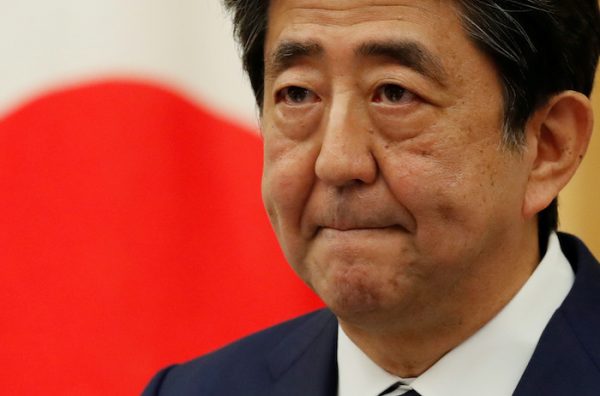The US-Japan alliance was the first policy area in which Abe achieved striking success. After establishing the National Security Council in 2013, the Abe government worked for two years to reinterpret the Article 9 ‘peace clause’ of Japan’s Constitution to enable the Japanese Self-Defence Forces (SDF) to fight with US troops. This interpretation is based on a limited recognition of the right to collective self-defence in situations when threats against the United States constitute a threat to Japan’s survival.
Abe visited the United States in April 2015 and made a historic speech at a joint meeting of the US Congress where he expressed his ‘repentance’ to US soldiers who fought against Japan during the Second World War. This was followed by President Barack Obama’s visit to Hiroshima and Abe’s visit to Pearl Harbour in 2016.
Abe was fortunate to have realised these achievements before the election of Donald Trump. In addition to forging an Abe–Trump bromance, Abe could argue that Japan had ceased to be a free-rider and was prepared to act more responsively and creatively. This argument was further supported by the Free and Open Indo-Pacific initiative.
Japan’s China policy was Abe’s second major achievement. He transformed the relationship from one of antagonism to friendship without provoking the United States. He inherited from the Democratic Party of Japan an impossible situation in the Senkaku Islands, where the Chinese government had begun sending coast guard vessels to emphasise its claim to sovereignty. Abe’s initial policy was one of deterrence, strengthening the Maritime SDF and the Japan Coast Guard with a new islands defence strategy, implying Senkaku.
Dialogue initially took place timidly. The first Abe–Xi meeting took place in October 2014 under icy circumstances, which continued until May 2017. Abe then sent a quiet message to Xi expressing his interest in cooperating with China on its Belt and Road Initiative. This new strategy worked — China reciprocated with an enhanced policy of dialogue developing in 2018 with Chinese Premier Li Keqiang’s visit to Tokyo in May and Abe’s visit to Beijing in October. In 2019, Xi made his first visit to Japan to attend the Osaka G20 summit. This was to be followed by Xi’s first bilateral visit to Japan in the April of 2020, which was cancelled due to COVID-19.
The third, and unexpected, area of success for Abe was Japan’s reconciliation with Asia. In August 2015, on the 70th anniversary of the end of the Second World War, Abe made a statement largely in line with former prime minister Tomiichi Murayama’s statement in 1995 apologising for Japan’s wartime transgressions. By the end of 2015, Abe reached an agreement with the South Korean government on the comfort women issue, expressing his apology with almost the identical wording used in the Kono statement in 1993.
There are three issues that Abe explicitly quoted in his press conference on 28 August as missed opportunities — constitutional revision, the abduction issue with North Korea and the peace treaty with Russia.
These were difficult issues for Abe. Revising Japan’s Constitution was a great objective, but the pacifist reaction in Japan was very strong and reflecting this Abe’s proposed revision did not go further than explicitly recognising the constitutionality of the SDF — of which very few people doubted anyway. The most sensitive issue of the right to collective self-defence (albeit in limited forms) has already been resolved.
Abe’s North Korea policy, adapting swiftly to Trump’s unconventional approach, was sufficiently flexible and creative. After the second Trump-Kim summit, Abe announced that he was ‘ready to meet Kim Jong-un without pre-conditions’, but the outcome of the negotiations towards an Abe-Kim summit has not been publicly revealed. Japan’s manoeuvring power was limited — it was contingent on the North Korean position in international politics and perhaps Abe did not have much leverage to move Kim on the abduction issue.
Dealings with Russia could have been different. Abe was the most determined post-war prime minister in Japan to make continuous efforts to find a real breakthrough on Japan–Russia relations. His approach was holistic, seeking progress on both economic and territorial issues, ready for an enhanced security dialogue. But after the summit meeting in Singapore in November 2018, Putin’s administration backed away, inflating nationalist emotion which paralysed the negotiations.
It is also unclear to outsiders how the Japanese bureaucracy negotiated or how effectively they coordinated with the US administration. To his regret, Abe’s negotiating position might not have been as strong as he wanted.
For whoever succeeds Abe, dealing with COVID-19 and navigating US–China rivalry are the top priorities. Given the enormity of these tasks, Abe’s three ‘unachieved issues’ may stay on the agenda but without much expectation of progress.
Abe’s most significant foreign policy failure was South Korea. After the South Korean Supreme Court verdict on forced labour in October 2018 and Japan imposed trade restrictions on South Korea in June 2019, bilateral political relations rapidly fell apart with no prospect for recovery. This deterioration was unnecessary and one wonders what professional advice Abe was given from his government.
If Abe’s successor intends to serve the long-term national interest and avoid further deterioration of the Japan–South Korea relationship, now is the time to explore the chance for a reset in relations..
Kazuhiko Togo is Visiting Professor at Kyoto Sangyo University.

